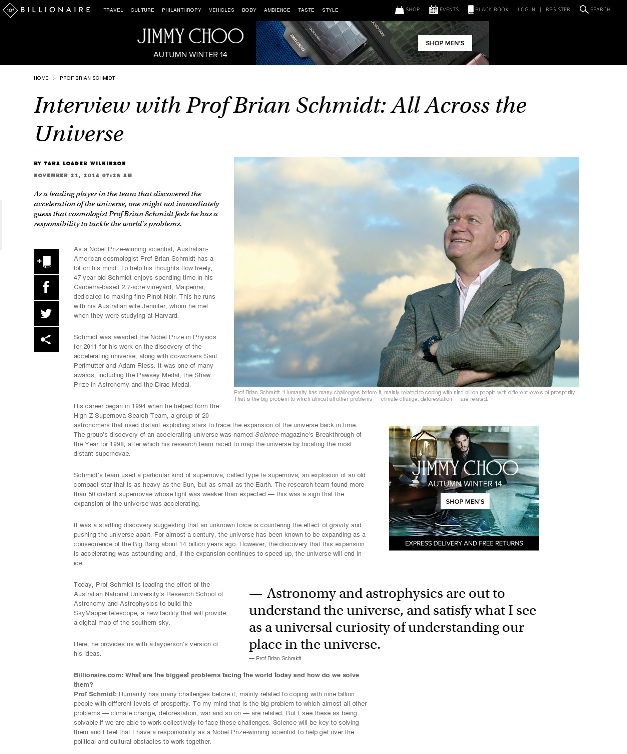|
| |
 |
|
Interview with Prof Brian Schmidt: All Across the Universe
|
Billionaire
21 November 2014
www.billionaire.com/prof-brian-schmidt
As a leading player in the team that discovered the acceleration of the universe, one might not immediately guess that cosmologist Prof Brian Schmidt feels he has a responsibility to tackle the world's problems.
As a Nobel Prize-winning scientist, Australian-American cosmologist Prof Brian Schmidt has a lot on his mind. To help his thoughts flow freely, 47-year-old Schmidt enjoys spending time in his Canberra-based 2.7-acre vineyard, Maipenrai, dedicated to making fine Pinot Noir. This he runs with his Australian wife Jennifer, whom he met when they were studying at Harvard.
Schmidt was awarded the Nobel Prize in Physics for 2011 for his work on the discovery of the accelerating universe, along with co-workers Saul Perlmutter and Adam Riess. It was one of many awards, including the Pawsey Medal, the Shaw Prize in Astronomy and the Dirac Medal.
His career began in 1994 when he helped form the High-Z Supernova Search Team, a group of 20 astronomers that used distant exploding stars to trace the expansion of the universe back in time. The group's discovery of an accelerating universe was named Science magazine's Breakthrough of the Year for 1998, after which his research team raced to map the universe by locating the most distant supernovae.
Schmidt's team used a particular kind of supernova, called type Ia supernova, an explosion of an old compact star that is as heavy as the Sun, but as small as the Earth. The research team found more than 50 distant supernovae whose light was weaker than expected - this was a sign that the expansion of the universe was accelerating.
It was a startling discovery suggesting that an unknown force is countering the effect of gravity and pushing the universe apart. For almost a century, the universe has been known to be expanding as a consequence of the Big Bang about 14 billion years ago. However, the discovery that this expansion is accelerating was astounding and, if the expansion continues to speed up, the universe will end in ice.
Today, Prof Schmidt is leading the effort of the Australian National University's Research School of Astronomy and Astrophysics to build the SkyMapper telescope, a new facility that will provide a digital map of the southern sky.
Here, he provides us with a layperson's version of his ideas.
Billionaire.com: What are the biggest problems facing the world today and how do we solve them?
Prof Schmidt: Humanity has many challenges before it, mainly related to coping with nine billion people with different levels of prosperity. To my mind that is the big problem to which almost all other problems - climate change, deforestation, war and so on - are related. But I see these as being solvable if we are able to work collectively to face these challenges. Science will be key to solving them and I feel that I have a responsibility as a Nobel Prize-winning scientist to help get over the political and cultural obstacles to work together.
How can astronomy and astrophysics contribute to peace and prosperity?
Astronomy and astrophysics are out to understand the universe, and satisfy what I see as a universal curiosity of understanding our place in the universe. In undertaking this exploration, though, children are motivated to study science and mathematics, scientists who do all sorts of things are trained, and we invent useful things along the way too. The knowledge is shared by humanity, and this helps bring us together, and the knowledge also helps us meet the challenges facing humanity.
What do you think is the world's most important scientific discovery to date?
It is so very difficult for me to say that there is 'most important' discovery as everything is so interlinked, so I really cannot identify what is most important. Einstein's theory of general relativity I believe is perhaps the most impressive scientific leap - but not the most important.
What is your most important discovery?
For me, my role in helping discover that the universe is accelerating in its expansion is my most important discovery. It has told us that most of the universe was previously unknown. This 'dark energy' part of the universe, which is causing the acceleration, remains one of science's biggest mysteries.
Which countries are the most advanced in your field?
The US has been the traditional power in astronomy and astrophysics, but Europe is now also very strong. We in Australia are also quite successful given our size. Japan and Canada have improved over the past decade, and India and China are also rapidly engaging with astronomy. I am very encouraged by the current students coming up today. They have amazing skills and technology that impress me day in and day out.
How would you advise budding scientists to pursue this as a career path?
I always liked science and for those who like science my advice is to do it. I cannot guarantee you will end up a scientist in the area you are interested in, but it might happen. And if it doesn't, the training and knowledge are invaluable in whatever you choose to do in life, and open up many doors.
What role does your vineyard play in your life?
My vineyard is a chance to do something other than astronomy - it is creative, it is hard work and things sometimes beyond my control affect it. I find it a place to escape to just contemplate life, the universe and everything.
Prof. Schmidt will be talking on the theme of "Science: Humanity's Universal Bridge" as keynote speaker in the 5th ASEAN event series "Bridges - Dialogues Towards a Culture of Peace" facilitated by the International Peace Foundation in January 2015 in Thailand and Singapore. For more details of the schedule, please view www.peace-foundation.net.

|
|
|
